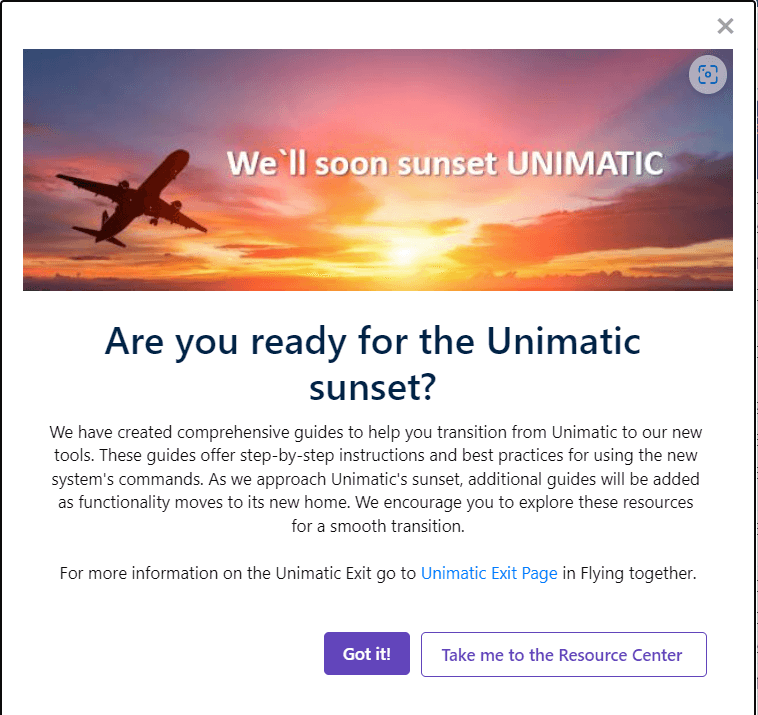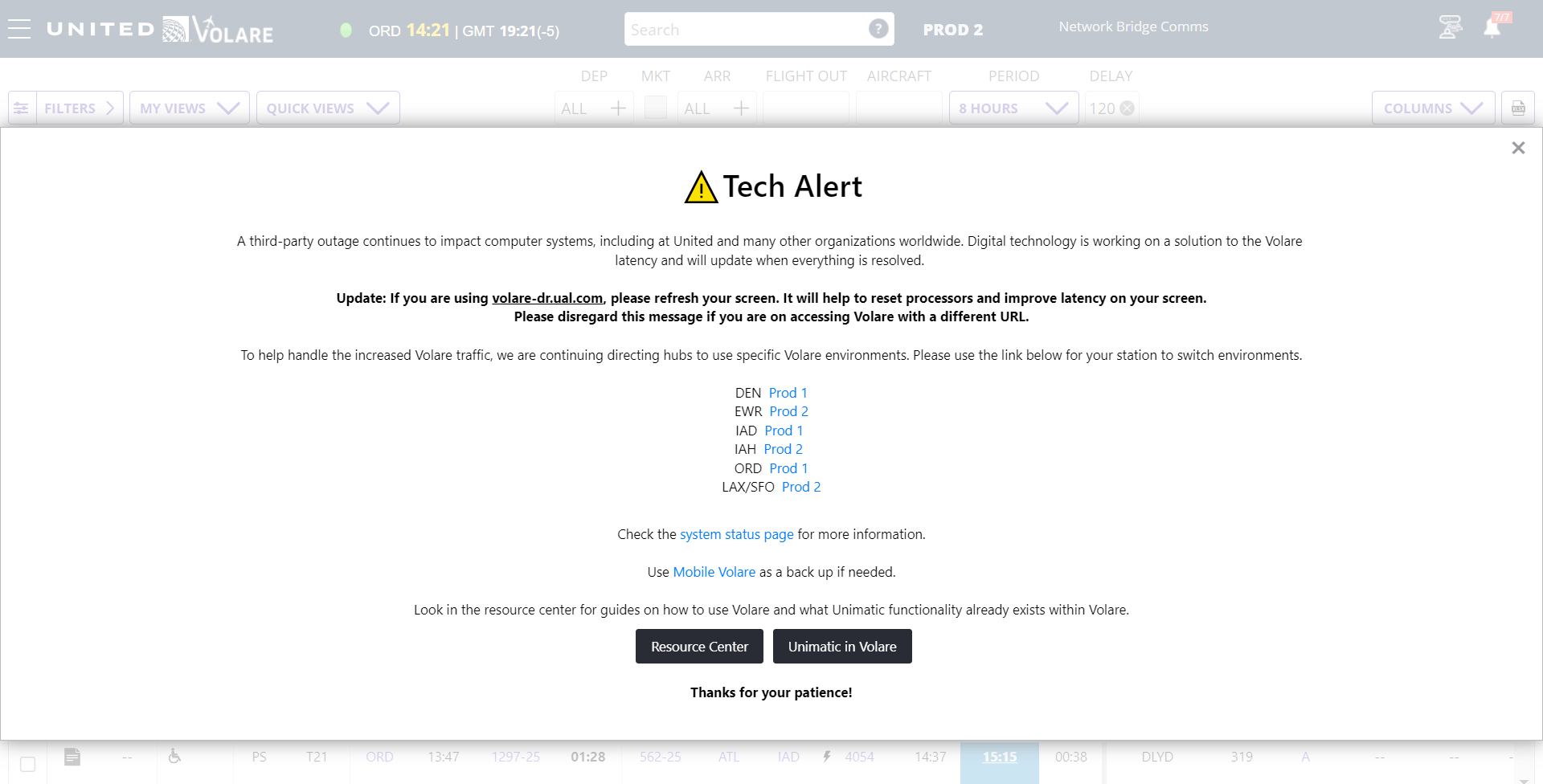From legacy to leading-edge: How United is modernizing workforce operations with Pendo

United Airlines at a glance
United is the largest airline in the world, flying 140 million people to more than 300 destinations across six continents every year.
Challenge
How can the airline boost productivity and efficiency without massively expanding its employee headcount during critical communication events?
Pendo’ing it
United relied on Pendo Guides to communicate urgent messages to users during the 2024 CrowdStrike outage and to migrate employees to new apps.
Results
They saw increased adoption of the new internal software applications and had the instant ability to communicate urgent information in real time.
Contents
Imagine if your business’ mission-critical cloud software was suddenly knocked offline.
Picture an outage so massive that simply bringing your systems back online might cause another crash.
That was the nightmare scenario facing United Airlines when the 2024 CrowdStrike outage hit. The outage affected 26,000 computers across 365 locations, forcing the cancellation of over 700 flights.
When United was ready to reboot their systems, they faced another crisis: Getting 100,000+ employees back into their tools. “There was such a surge of users and activity that we needed to divert traffic to different instances, so our tools could manage the load,” says Andrew Harrison, senior manager for operations, products, and strategy at United.
That’s when Harrison’s team realized that the solution they needed was already running on their internal software.
Using the Pendo platform to streamline user migration and training
Before the CrowdStrike crisis, United was working to modernize their internal software tools. It was an enormous undertaking: United had 24 separate teams, each with its own development arm. This led to siloed development and redundant applications.
Overall, the internal software landscape had over 85 applications, many with duplicate functionality. “Team A would build a tool with 20 data points. Team B would build another with their 20 data points, but only one or two would be different,” Harrison says. Then instead of consolidating the overlapping tools, each team would incorporate the others’ missing data points into separate tools, perpetuating the siloed ecosystem.
United is using the power of Pendo’s product analytics and in-app guides to whittle away the waste. With insights gleaned from Pendo, they can choose the right applications to sunset and concentrate development on the most-used, most essential apps.
One prime target for retirement was a dated, command-line based legacy system called Unimatic. “For each piece of information, you have to type in a specific command, and if you don’t know the commands you’ll have no idea how to use the tool,” he says. “The people who code it have been trying to retire for years. We’ve been holding onto them because Unimatic still runs much of the airline.”
United developed a new system, Volare, which was faster, more predictive and more user-friendly. Now they just needed employees to make the switch quickly and efficiently.
Harrison’s team deployed Pendo Guides in both tools to help users transfer their Unimatic knowledge to Volare. “So,” says Harrison, “if I’m trying to do this command in Unimatic, I can click this guide, and it’ll show me exactly how to do the same thing in Volare.”
Pendo empowered Harrison’s team to accelerate the changeover, using the power of product analytics and in-app guides to spot friction points and help users through them. According to Harrison, the strategic placement of these guides helped drive higher adoption through rapid acclimation with the new software.
To make the change even easier, United leveraged the Pendo Resource Center to ensure users weren’t burdened with irrelevant tutorials. Rather than putting the entire workforce through a tedious one-off training module outside the app, they empowered employees to explore the Resource Center in Volare to seek out what mattered most to them.
As a result, United employees were finding it easier to make the switch, which meant that United could start sunsetting Unimatic.

Ready for the unexpected: Pendo Guides and the CrowdStrike outages
With Pendo’s help, United was well on its way to migrating from Unimatic for good. Then the CrowdStrike outage hit.
As United rebooted its systems, they needed to quickly communicate where and how they needed users to get back into their software tools. Harrison realized that Pendo could be the hero they were looking for.
Using Pendo Guides, United put up a tech alert that a user would see upon opening Volare. They’d be directed to the appropriate instance to log into, depending on their location. This helped admins distribute the traffic burden to avoid bottlenecks, congestion and crashes.

Pendo helped United make a smooth recovery from the brink of catastrophe. What’s more, the recovery process actually helped move employees from Unimatic to Volare. “We saw a big jump in people coming in to look at the guides and use them to do the workflows we wanted them to do in the application,” Harrison said.
Pendo supports United Airlines as they create a future flight plan
United is still working with Pendo to pare down their software landscape. “We have 85 tools within our network operations center,” Harrison says, “and a lot of what we’re trying to do is to consolidate and sunset [many of them].”
Still, he notes, with those efforts come questions: Which users will be impacted? How are they using the apps in question? What will the new way of working look like?
With Pendo, United has the analytical capacity to answer these questions. And most importantly, they have the tools to ensure swift and painless adoption of new solutions. “We can now deploy Pendo on these applications,” Harrison says. “We can drive them from one to the other. Deploying Pendo at scale is big in terms of what’s next for us.”
“Deploying Pendo at scale is big in terms of what’s next for us.”
Even if United’s scheduled flight plan experiences unexpected turbulence, they know Pendo is ready to help.
